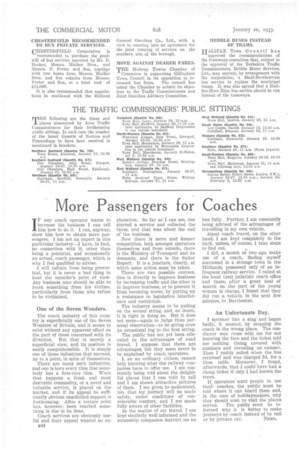More Passengers for Coaches
Page 58

If you've noticed an error in this article please click here to report it so we can fix it.
IF any coach operator wants to increase his business I can tell him how to do it. I can, anyway, show him how to obtain more passengers. I km not an expert in this particular industry—I have, in fact, no connection with it, other than being a potential, and occasionally an actual, coach passenger, which is why I feel qualified to advise.
I will refrain from being proverbial, but it is never a bad thing to hear the outsider's point of view. Any business man should be able to learn something from his victims, particularly from those who refuse to be victimized.
One of the Seven Wonders.
The coach industry of this country is superficially one of the Seven Wonders of Britain, and it seems to exist without any apparent effort on the part of those concerned with its direction. But that is merely a superficial view, and its position is easily comprehensible. It is simply one of those industries that succeed, up to a point, in spite of themselves.
There are many such industries, and one is born every time that somebody has a first-rate idea. When that happens a fresh and most desirable commodity, or a novel and valuable service, is placed on the market, and if its appeal be sufficiently obvious unsolicited support is forthcoming. After a certain point has, however, been reached something is due to be done.
Coach services are obviously useful and their appeal wanted no exB44 planation. So far as I can see, one started a service and collected the fares, and that was about the end of the business.
Now there is more and keener competition, both amongst operators themselyes and from outside, there is the Ministry of Transport and its demands, and there is the Salter Report. It is a juncture, clearly, at which some action must be taken.
There are two possible courses. One is directly to improve business by increasing traffic and the other is to improve business, or to prevent it from becoming worse, by putting ,up a resistance to legislative interference and restriction.
The industry seems to be pulling on the second string, and, no doubt, it is right in doing so. But it does not seem—again to judge from personal observation—to be giving even an occasional tug to the first string.
The public has not yet been educated to, the advantages of road travel. I suppose that there are advantages, but they seem never to be explained by coach operators.
I, as an ordinary citizen, cannot help knowing what the railway companies have to offer me. I am constantly being told about the delightful places that I can visit by rail and I am shown attractive pictures of them. I am given to understand, too, that my journey will be made safely, under conditions of considerable comfort, and I am made fully aware of other facilities.
In the matter of air travel, I am kept similarly well informed and the steamship companies instruct me no less fully. Further, I am constantly being advised of the advantages of travelling in my own vehicle.
About coach travel, on the other hand, I am kept completely in the dark, unless, of course, I take steps to find out.
I did, a month or two ago, make use of a coach, finding myself marooned in a strange town in the Midlands, possessed only of an infrequent railway service. I called at the local (and palatial) coach office and there; after a great deal of search on the part of the young woman in charge. I found that they did run a vehicle, in the next few minutes, to Barchester.
An Unfortunate Day.
I sprinted like a stag and began badly, it seemed, by stopping the coach in the wrong place. The conductor was cross with me for not knowing the fare and the ticket told me nothing (being covered with numbers and revealing no names). Then I rashly asked when the bus returned and was charged 3d. for a time table. Moreover, I found, afterwards, that I could have had a cheap ticket if only I had known the ropes.
If operators want people to use theii coaches, the public must be told where it can board them and, in the case of holidaymakers, why they should wish to visit the places served. The public must be informed why it is better to make journeys by coach instead of by rail
or by private car. NEMO.




























































































